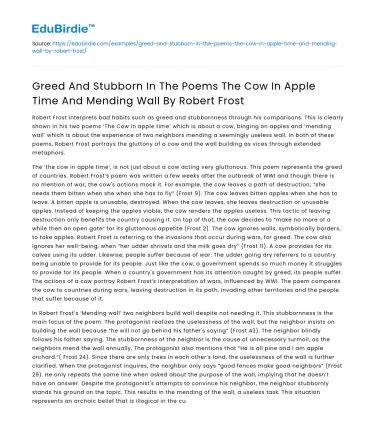Robert Frost interprets bad habits such as greed and stubbornness through his comparisons. This is clearly shown in his two poems ‘The Cow in apple time’ which is about a cow, binging on apples and ‘mending wall’ which is about the experience of two neighbors mending a seemingly useless wall. In both of these poems, Robert Frost portrays the gluttony of a cow and the wall building as vices through extended metaphors.
The ‘the cow in apple time’, is not just about a cow acting very gluttonous. This poem represents the greed of countries. Robert Frost’s poem was written a few weeks after the outbreak of WWI and though there is no mention of war, the cow's actions mock it. For example, the cow leaves a path of destruction; “she needs them bitten when she when she has to fly” (Frost 9). The cow leaves bitten apples when she has to leave. A bitten apple is unusable, destroyed. When the cow leaves, she leaves destruction or unusable apples. Instead of keeping the apples viable, the cow renders the apples useless. This tactic of leaving destruction only benefits the country causing it. On top of that, the cow decides to “make no more of a while then an open gate” for its gluttonous appetite (Frost 2). The cow ignores walls, symbolically borders, to take apples. Robert Frost is referring to the invasions that occur during wars, for greed. The cow also ignores her well-being, when “her udder shrivels and the milk goes dry” (Frost 11). A cow provides for its calves using its udder. Likewise, people suffer because of war. The udder going dry referrers to a country being unable to provide for its people. Just like the cow, a government spends so much money it struggles to provide for its people. When a country's government has its attention caught by greed, its people suffer. The actions of a cow portray Robert Frost’s interpretation of wars, influenced by WWI. The poem compares the cow to countries during wars, leaving destruction in its path, invading other territories and the people that suffer because of it.
Save your time!
We can take care of your essay
- Proper editing and formatting
- Free revision, title page, and bibliography
- Flexible prices and money-back guarantee
In Robert Frost’s ‘Mending wall’ two neighbors build wall despite not needing it. This stubbornness is the main focus of the poem. The protagonist realizes the uselessness of the wall, but the neighbor insists on building the wall because “he will not go behind his father's saying” (Frost 43). The neighbor blindly follows his father saying. The stubbornness of the neighbor is the cause of unnecessary turmoil, as the neighbors mend the wall annually. The protagonist also mentions that “He is all pine and I am apple orchard.”( Frost 24). Since there are only trees in each other’s land, the uselessness of the wall is further clarified. When the protagonist inquires, the neighbor only says “good fences make good neighbors” (Frost 29). He only repeats the same line when asked about the purpose of the wall, implying that he doesn’t have an answer. Despite the protagonist's attempts to convince his neighbor, the neighbor stubbornly stands his ground on the topic. This results in the mending of the wall, a useless task. This situation represents an archaic belief that is illogical in the current situation. This stubbornness Robert Frost portrays can be applied to a plethora of situations.
In his two poems ‘The Cow in apple time’ and ‘mending wall’ Robert Frost portrays the gluttony of a cow and the wall building as vices through extended metaphors. The metaphors portrayed one cows’ desire for apples which was compared to the greed of countries during wartime and the mending of a wall as a stubborn belief. By comparing these bad habits to other situations, Robert Frost makes it easier to apply the message of the story to the reader’s own life.






 Stuck on your essay?
Stuck on your essay?

